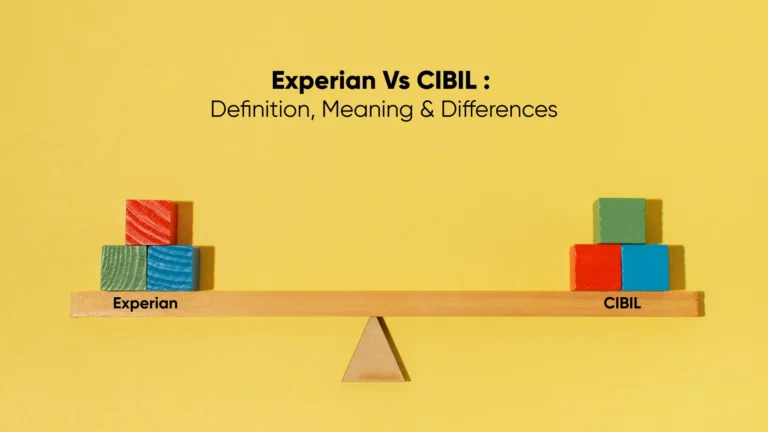Your credit score plays a big role in whether you will get loan approval and at what interest rate. Both Experian and CIBIL are trusted credit bureaus in India, but they differ slightly in how they calculate scores. While CIBIL is widely used by Indian lenders, Experian is a global credit reporting agency with growing adoption.
Platforms like Zype may refer to either score when evaluating eligibility. Knowing the difference between the two helps you stay financially ready and improves your chances of quick loan approvals.
Both Experian and CIBIL are leading credit bureaus in India that assess creditworthiness. However, Experian is a global company, whereas CIBIL is India-specific. They differ in their data sources and scoring models, which can lead to variations in credit scores. Understanding these differences can help you better manage your credit profile and financial health.
Table of Contents
ToggleWhat is Experian?
Experian is a leading global information services company and a trusted credit bureau, providing data and analytical tools to help individuals, businesses, and society make informed financial decisions. With deep expertise in the financial sector, Experian empowers smarter choices by delivering accurate insights and reliable credit information.
What is CIBIL?
Credit Information Bureau (India) Limited, or CIBIL, is the first credit information company in India. It collects credit information from financial institutions and tracks credit reports and scores for both people and businesses. With the help of CIBIL, lenders can make an informed credit decision. The CIBIL credit reports contain detailed information about an individual’s or business’s credit history, including payment patterns, debt-to-credit ratios, credit utilisation, and more.
What is the Difference Between Experian And CIBIL Scores?
Let’s understand why Experian and CIBIL scores are different. Few points on difference between CIBIL and Experian occur are:
Point of difference | Experian | CIBIL |
Data | Experian uses data from various sources globally. | CIBIL collects data majorly from banks and financial institutions. |
Scoring Models | Experian uses the FICO model for scoring | CIBIL’s model is more specific to the Indian financial market. |
Market Presence | Experian is widely used in multiple countries | CIBIL is widely used in India |
Credit Range | Experian specifies a range of 300-850. A credit score of 700 and above is considered good | CIBIL, on the other hand, uses a 300 to 900 scale, where a score above 750 is typically seen as strong by Indian lenders. |
Recording Methods | Updated based on reports from Indian lenders | May differ in update frequency and methodology |
Data Sources | Collects data mainly from Indian banks, NBFCs, and credit institutions. | Gathers data from both Indian lenders and international financial institutions. |
Weightage to Credit Factors | More focus on credit history & repayment track | Slightly higher weight on recent activity & usage |
Other Influencing Factors Behind Score Differences
Even though CIBIL and Experian are both RBI-approved credit bureaus, differences in data reporting practices by lenders can lead to score variations.
Parameter | CIBIL | Experian |
Presence | India-focused | Global presence, including India |
Popularity | More popular among Indian banks and NBFCs | Gaining traction among fintechs and digital credit platforms |
Recognition | Highly recognized in India and one of the oldest credit bureau | Globally recognized credit bureau |
Date of Establishment | 2000 | 2006 (India) / 1996 (Global) |
Subscription Charges | Free 1 report/year; paid plans start ₹550–₹1,200/year | Free 1 report/year; paid plans start ₹399–₹1,199/year |
Credit Score Range | 300 to 900 (750+ is good) | 300 to 850 (700+ is good) |
Delivery of Reports (Offline) | Available on request; additional charges may apply | Mostly digital; offline delivery available on request |
Factors Affecting Experian and CIBIL Scores
Payment History: Payment history is one of the important factors that affect credit scores. It shows your track record and reflects your past payments. Late payments or defaults on your past payments can impact your credit score. You will eventually find it difficult to get credit.
Credit Utilisation: Credit utilisation refers to the amount of credit you are using to the total amount of credit available to you. It’s a ratio of your credit limit that you’re using at any given time. 30% is a widely recommended credit utilisation rate.
Length of Credit History: This refers to how long you have been using credit. It is important to determine your credit score. The longer credit history is generally seen as a positive indicator of financial responsibility. It demonstrates the ability of an individual to manage credit well over a longer period.
Credit Mix: Credit mix refers to the various types of credit accounts you have in your financial portfolio. Lenders consider the different types of credit you manage, such as credit cards, mortgages, secured and unsecured personal loans, etc. to assess your credit record. It is important to diversify your credit record, however, managing credit accounts responsibly and avoiding opening unnecessary accounts will keep your portfolio positive and diversified.
Recent Credit Activity: When you open new credit accounts within a certain period which is closely assessed by lenders and credit scoring models is called recent credit activity. When you apply for new credit, whether it’s a credit card, the lender typically takes a close look at your credit report. However, multiple inquiries within a short period can negatively impact your portfolio.
Also Read: How to Get a Perfect 900 Credit/CIBIL Score?
Importance of Experian and CIBIL Scores
Importance of Experian
Experian is a globally recognized credit bureau, increasingly used by fintech platforms and digital lenders in India. A score of 700+ is considered good for most loan approvals. It’s known for fast, tech-enabled assessments, making it ideal for instant personal loans through apps like Zype. Experian gathers data from various sources, offering a dynamic view of your credit behaviour.
Importance of CIBIL
CIBIL (TransUnion CIBIL) is India’s oldest and most widely accepted credit bureau. A score of 750+ is generally seen as excellent and is often a key factor in loan approvals by traditional banks and NBFCs. CIBIL focuses heavily on repayment history and long-term credit behaviour. Maintaining a high CIBIL score helps in securing better interest rates and higher loan amounts.
Conclusion
Experian or CIBIL scores are important to an individual. Understanding the differences between CIBIL and Experian and the factors affecting credit scores is essential for managing personal finances effectively. Regularly monitoring and improving credit scores can eventually lead to financial opportunities. You will have several lender options if your credit score is good, and you repay personal loans on time. Moreover, a thorough understanding of Experian and CIBIL enables lenders to make informed decisions while giving loans.
Frequently Asked Questions
What Is The Meaning Of Experian?
Experian is a multinational data analytics and credit reporting company that provides data across the globe which provides reports and credit scores to individuals and businesses.
What Is The Meaning Of Cibil?
CIBIL (Credit Information Bureau India Limited) is a credit information Indian company licensed by RBI that provides data reports and credit scores to individuals and businesses.
What Is A Good Credit Score?
The credit scores between a scale of 300 to 900 in India and a credit score between 660 to 724 are considered good. However, the best practice is to maintain a credit score of above 750.
How Does Experian Calculate Credit Scores Compared To Cibil?
Experian collects information and data from various sources which mainly includes banks and financial institutions across the globe. CIBIL’s model focuses more on the Indian financial market. CIBIL collects credit information from Indian lending institutions and financial entities.
Which Credit Bureau Is More Widely Used In India, Experian Or Cibil?
CIBIL is the credit bureau that is most widely used in India.
How do lenders interpret Experian or CIBIL scores when assessing creditworthiness?
A higher credit score concludes a better credit history, and a low score indicates more chances of defaults on an individual’s side. Hence, lenders can lend money to the borrowers based on the borrower’s credit score.
Can I Have Different Scores From Experian And Cibil?
Both Experian and CIBIL use different parameters, methods, and algorithms to determine scores and prepare credit scores.
How Often Are Experian And Cibil Scores Updated?
Experian and CIBIL scores usually get updated every month
Who Uses Experian Credit Score?
Experian scores are commonly used by fintech apps, digital lenders, and credit card providers for faster credit evaluation. It’s preferred for *instant loans, buy-now-pay-later services**, and other tech-driven credit products in India.
Is Experian Credit Score Safe?
Yes, Experian Credit Score is safe. It is regulated by the RBI and follows strict data protection norms to keep your financial information secure.
Is Experian Credit Score Accurate?
Yes, Experian Credit Score is accurate. It is based on your credit history, repayment behavior, and borrowing patterns reported by banks and NBFCs, making it a reliable indicator of your creditworthiness.








